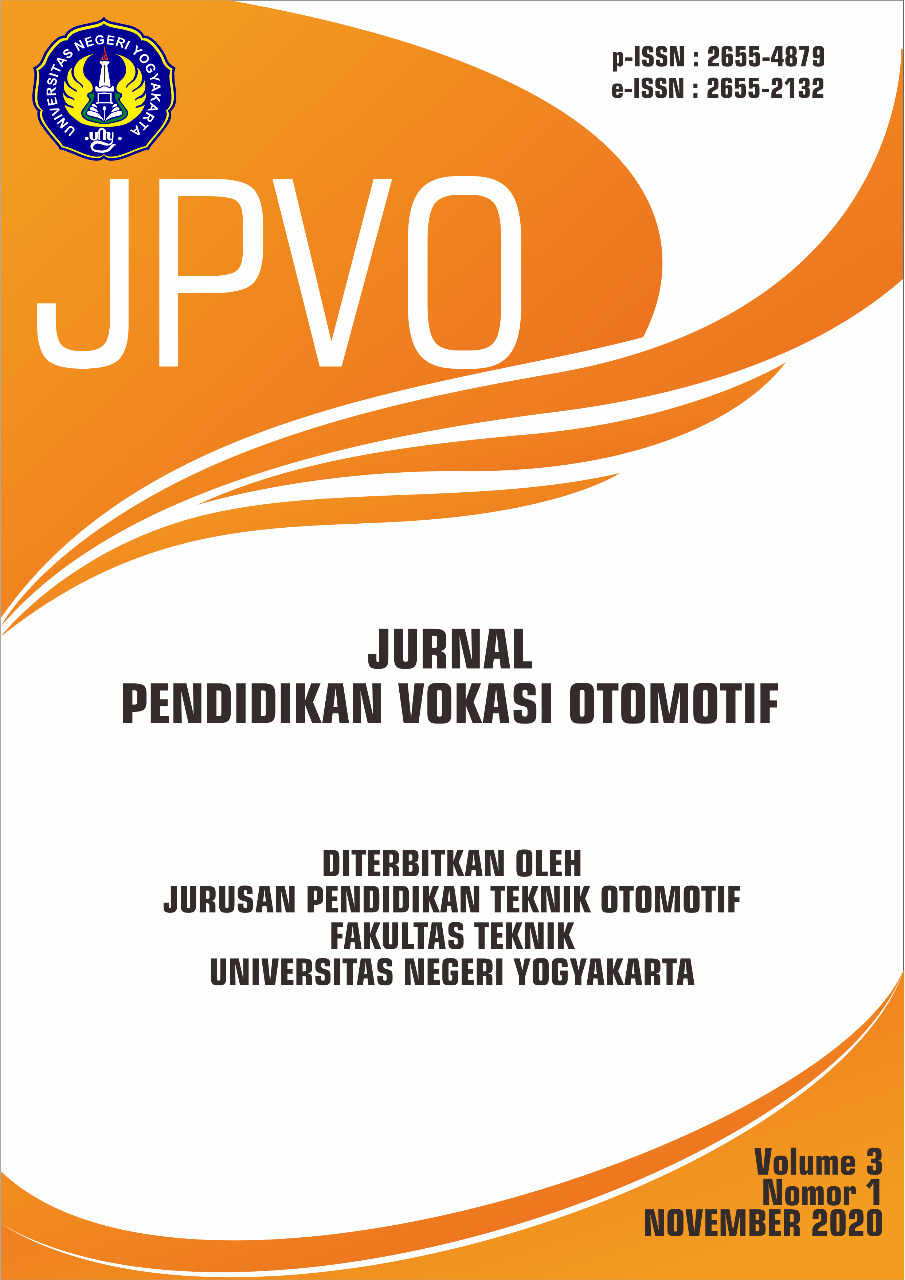Development of The Automotive Technology Vocational Education Curriculum Based on Current Needs of The Automotive Industry
DOI:
https://doi.org/10.21831/jpvo.v6i2.73156Keywords:
analysis, competency, industry, automotiveAbstract
References
Al-Fikri, H. M. (2021). Peluang dan Tantangan Perguruan Tinggi Menghadapi Revolusi Digital Di Era Society 5.0. Prosiding Seminar Nasional Pendidikan, 3, 350–355. https://prosiding.unma.ac.id/index.php/semnasfkip/article/view/621
Billett, S. (2001). Learning in the workplace: Strategies for effective practice. Allen & Unwin.
Crouch, G. I., & Mazanov, J. (2017). Automotive Skills and Knowledge Requirements in the 21st Century. Journal of Vocational Education & Training, 69 (4), 522–543.
European Centre for the Development of Vocational Training. (2018). Changing Skills for a Changing World: An Analysis of the Demand for Skills up to 2030. Luxembourg: Publications Office of the European Union.
Fatah, A., Kir, :, Yoga, H. ;, Sampurna, G., Supriyono, ;, Kurniawan, D., Amar, ;, Nawa, N. ;, Maulidino, R., & Jafar, M. (2023). Analisis Materi Esensial Mata Pelajaran Panel Body dan Rangka pada Kurikulum Merdeka. In Jurnal Pendidikan Vokasi Otomotif (Vol. 6, Issue 1).
Hadi, S., & Rabiman, R. (2014). Partisipasi Industri Otomotif dalam Menjalin Kerjasama dengan Sekolah Menengah Kejuruan (SMK) Program Keahlian Teknik Kendaraan Ringan di Daerah Istimewa Yogyakarta. Jurnal Taman Vokasi, 2(2). https://doi.org/10.30738/jtv.v2i2.80
Halderman, J. D. (2018). Automotive Technology: Principles, Diagnosis, and Service. Pearson.
Hardiyanta, R. A. P., Suyanto, W., Arifin, Z., Mujaki, A., & Saputro, R. D. A. (2021). Training needs analysis for management of facilities and infrastructure learning automotive engineering. Journal of Physics: Conference Series, 1833(1). https://doi.org/10.1088/1742-6596/1833/1/012016
Hardiyanta, R. A. P. ;, & Wagiran. (2023). Evaluasi Uji Kompetensi Keahlian Teknik Kendaraan Ringan Otomotif SMK di Kota Yogyakarta. In Jurnal Pendidikan Vokasi Otomotif (Vol. 5, Issue 2).
Industry 4.0: Impact on Education and Training in the Automotive Sector. (2019). European Training Foundation. Retrieved from https://www.etf.europa.eu/en/publications-and-resources/publications/industry-40-impact-education-and-training-automotive-sector
J. B. Sukoco, N. I. Kurniawati, R. E. Werdani, and A. Windriya. (2019). Pemahaman Pendidikan Vokasi di Jenjang Pendidikan Tinggi bagi Masyarakat. Jurnal Pengabdian Vokasi, vol. 1, no. 1, pp.23-26. https://doi.org/10.14710/jpv.2019.4796
Kennedy, P. S. J. (2020). Tantangan Pendidikan Tinggi Menghadapi Perkembangan Teknologi Digital Dalam Era VUCA.
Kurniawan, R., Jaedun, A., Mutohhari, F., & Kusuma, W. M. (2021). The Absorption of Vocational Education Graduates in The Automotive Sector in The Industrial World. Journal of Education Technology, 5(3), 482–490. https://doi.org/10.23887/jet.v5
Mahmudah, F. N., Baswedan, A. R., & Cahyono, S. M. (2023). Digital entrepreneurship competence of vocational students. Jurnal Pendidikan Teknologi Dan Kejuruan, 29(2), 01–16. https://doi.org/10.21831/jptk.v29i2.55497
Miao, W., Badir, Y. F., & Jahankhani, H. (2019). Preparing the Next Generation of Automotive Engineers: A Case Study of Educational Programmes in the United Kingdom. International Journal of Automotive Technology and Management, 19(1/2), 47–70.
Rosmaini, R., Tanjung, H. (2019). Pengaruh Kompetensi, Motivasi Dan Kepuasan Kerja Terhadap Kinerja Pegawai. Jurnal Ilmiah Magister Manajemen. Vol 2, No 1. https://doi.org/10.30596/maneggio.v2i1.3366
Suhartanta, Efendi, Y., Wakid, M., & Usman, T. (2023). Akulturasi Kompetensi Bidang Chasis Kendaraan pada Kurikulum Berbasis Kerjasama Industri. In Jurnal Pendidikan Vokasi Otomotif (Vol. 6, Issue 1).
World Economic Forum. (2023). The Future of Jobs Report 2023. Geneva: World Economic Forum. https://www.weforum.org/publications/the-future-of-jobs-report-2023/digest/
Downloads
Published
How to Cite
Issue
Section
Citation Check
License
Jurnal Pendidikan Vokasi Otomotif allows readers to read, download, copy, distribute, print, search, or link to the full texts of its articles and allow readers to use them for any other lawful purpose. The journal allows the author(s) to hold the copyright without restrictions. Finally, the journal allows the author(s) to retain publishing rights without restrictions

Jurnal Pendidikan Vokasi Otomotif is licensed under a Creative Commons Attribution-ShareAlike 4.0 International License.
Based on a work at https://journal.uny.ac.id/index.php/jpvo.









